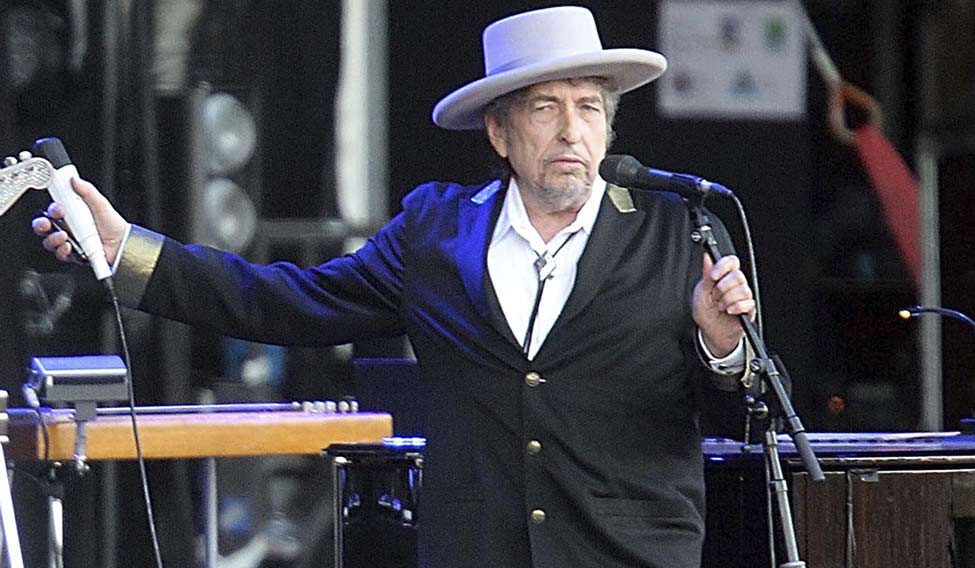On October 13, 2016, Bob Dylan won the Nobel Prize in Literature "for having created new poetic expressions within the great American song tradition", the Swedish Academy announced. "He can be read, should be read, as a great poet in the English tradition," said Professor Sara Danius, permanent secretary of the academy. Predictably, the cyber world erupted into a ruckus as soon as the news broke. Writers Salman Rushdie, Joyce Carol Oates and Naomi Klein expressed their elation over Dylan winning the Nobel.
"Asked about Nobel for Dylan: inspired & original choice. His haunting music & lyrics have always seemed, in the deepest sense, 'literary'," wrote Joyce Carol Oates on Twitter.
"From Orpheus to Faiz, song & poetry have been closely linked. Dylan is the brilliant inheritor of the bardic tradition. Great choice," tweeted Rushdie.
But, not everybody seemed happy with the news. Said writer Gary Shteyngart, “I totally get the Nobel committee. Reading books is hard.”
"A world that gives Bob Dylan a Nobel Prize is a world that nominates Trump for president. Perhaps a Nobel Prize in 2025 will be awarded to Donald Trump for lyrical tweeting,” wrote columnist Tim Stanley in The Telegraph.
Speaking to THE WEEK, Christ University Associate Professor Shobana Mathews said that the brouhaha over Dylan winning the Nobel Prize was completely uncalled for. She has done intensive research on the musician, who was the subject of her MPhil thesis 'Folksong as Poem: A critical study of the lyrics of protest folk singer Bob Dylan'. "Essentially, literature evolved as an oral tradition. In that sense, I see this award merely as a return to the roots. As an academic, the biggest hurdle that I faced while studying Dylan was that he could not be pegged into any single category. His work is unrestrained, not representative of anything. In my work, I have compared him to a 11th century troubadour named Guillaume the ninth. He was known as Trovatore bifronte (or the two-faced bard), someone who never exposed himself in front of the audience.
“In my opinion, he also draws comparisons to Greek philosopher Diogenes of Sinope and modern-day rationalist Christopher Hitchens. A story goes that Diogenes was asked why he acted like a dog in spite of his high birth. In reply, he threw his food on the ground and ate it like an animal. The latter is a rational thinker, whose main subject of thought is freedom—not limited by national or ideological restraints. The same is the case for Dylan, on whom both the left and right have laid claim," she said.
Even while his writings have definite influences of the literary greats, he avoids categorisation like plague. That is what sets him apart from the rest, says Mathews. "The works of Arthur Rimbaud were a great influence on him. Rimbaud talks about derangement of the senses, how a poet must disorganise his senses and put it back together again. These influences can be seen in Dylan's Rainy Day Woman and Ballad of a Thin Man. The works of Dylan Thomas, like Fern Hill, also have this beautiful way of breaking up the senses with its chopped up syntaxes. While he is normally considered a mainstream pop phenomenon, there are definite traces of classicists like T.S. Eliot in him. Songs like Mr Tambourine Man, which deals with notions like entry and collapse of the mind, have a very Eliotesque feel," she says.
However, what the fanboys and detractors alike failed to account for was the total lack of interest (almost Dylanesque) that the musician has reserved for even the highest literary honour in the world. The Telegraph reported that Dylan was yet to acknowledge the Nobel Prize and that the committee had given up trying to reach him. Fortunately, with the wealth of lyrics that Dylan has left strewn around in every corner of the world, it will not be an impossible task to gauge his reaction to the prize announcement.
Ah, you’ve been with the professors and they’ve all liked your looks
With great lawyers you have discussed lepers and crooks
You’ve been through all of F. Scott Fitzgerald’s books
You’re very well-read, it’s well-known
But something is happening here and you don’t know what it is
Do you, Mr. Jones?
(Ballad of a Thin Man)
And Ezra Pound and T. S. Eliot
Fighting in the captain’s tower
While calypso singers laugh at them
And fishermen hold flowers
(Desolation Row)
Come writers and critics who prophesize with your pen
And keep your eyes wide the chance won’t come again
And don’t speak too soon for the wheel’s still in spin
(The Times They Are A-Changin)
(In the wistful mind's eye of this author, an ever-so-slight sneer would curl around his shrivelled face. "Snobs," he would mutter. In my defence, Bob Dylan is known to have called the poems of Robert Frost as nothing hard but 'soft boiled egg s*').
MUSIC
Dylan, the 'literary genius'
 FILE - Bob Dylan performing onstage at "Les Vieilles Charrues" Festival in Carhaix, western France | AP
FILE - Bob Dylan performing onstage at "Les Vieilles Charrues" Festival in Carhaix, western France | AP
This browser settings will not support to add bookmarks programmatically. Please press Ctrl+D or change settings to bookmark this page.
THE WEEK
Select your subscription
Please select subscription.
Select payment method
Please select payment method.
Confirm your subscription
Recharge E-Wallet
Enter recharge amount:
Topics :
#Bob Dylan
| #Nobel






